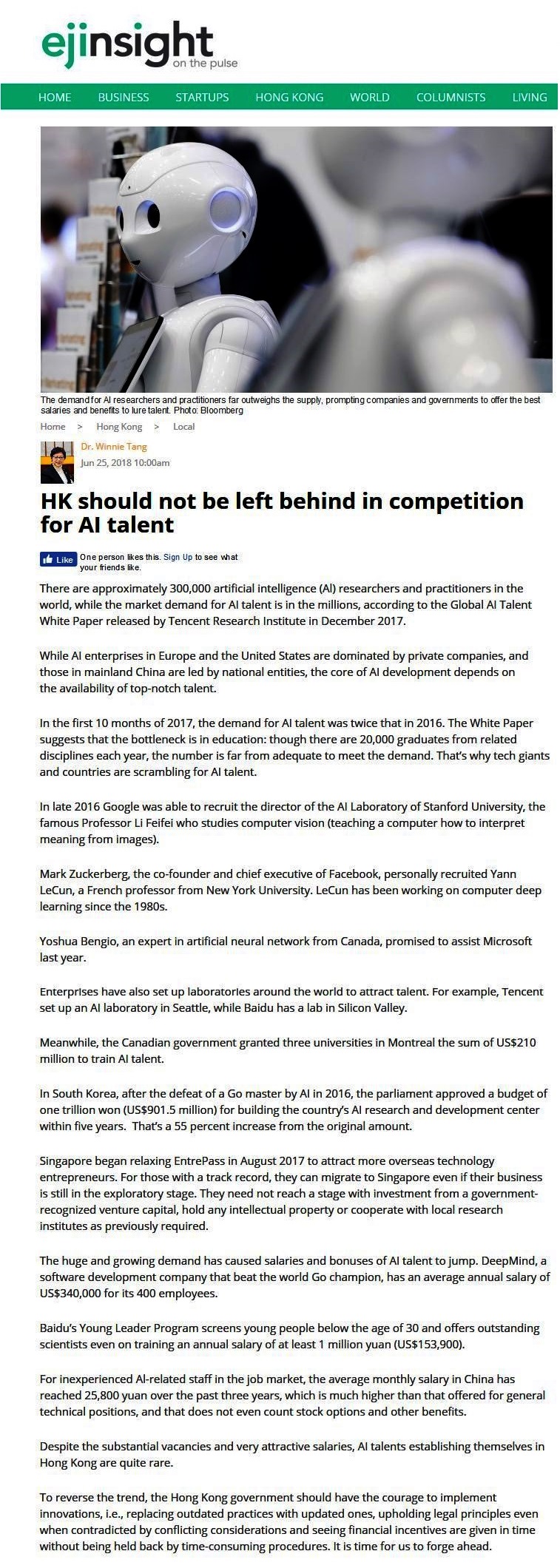網上版請按此

HK should not be left behind in competition for AI talent
There are approximately 300,000 artificial intelligence (Al) researchers and practitioners in the world, while the market demand for AI talent is in the millions, according to the Global AI Talent White Paper released by Tencent Research Institute in December 2017.
While AI enterprises in Europe and the United States are dominated by private companies, and those in mainland China are led by national entities, the core of AI development depends on the availability of top-notch talent.
In the first 10 months of 2017, the demand for AI talent was twice that in 2016. The White Paper suggests that the bottleneck is in education: though there are 20,000 graduates from related disciplines each year, the number is far from adequate to meet the demand. That's why tech giants and countries are scrambling for AI talent.
In late 2016 Google was able to recruit the director of the AI Laboratory of Stanford University, the famous Professor Li Feifei who studies computer vision (teaching a computer how to interpret meaning from images).
Mark Zuckerberg, the co-founder and chief executive of Facebook, personally recruited Yann LeCun, a French professor from New York University. LeCun has been working on computer deep learning since the 1980s.
Yoshua Bengio, an expert in artificial neural network from Canada, promised to assist Microsoft last year.
Enterprises have also set up laboratories around the world to attract talent. For example, Tencent set up an AI laboratory in Seattle, while Baidu has a lab in Silicon Valley.
Meanwhile, the Canadian government granted three universities in Montreal the sum of US$210 million to train AI talent.
In South Korea, after the defeat of a Go master by AI in 2016, the parliament approved a budget of one trillion won (US$901.5 million) for building the country's AI research and development center within five years. That's a 55 percent increase from the original amount.
Singapore began relaxing EntrePass in August 2017 to attract more overseas technology entrepreneurs. For those with a track record, they can migrate to Singapore even if their business is still in the exploratory stage. They need not reach a stage with investment from a government-recognized venture capital, hold any intellectual property or cooperate with local research institutes as previously required.
The huge and growing demand has caused salaries and bonuses of AI talent to jump. DeepMind, a software development company that beat the world Go champion, has an average annual salary of US$340,000 for its 400 employees.
Baidu's Young Leader Program screens young people below the age of 30 and offers outstanding scientists even on training an annual salary of at least 1 million yuan (US$153,900).
For inexperienced Al-related staff in the job market, the average monthly salary in China has reached 25,800 yuan over the past three years, which is much higher than that offered for general technical positions, and that does not even count stock options and other benefits.
Despite the substantial vacancies and very attractive salaries, AI talents establishing themselves in Hong Kong are quite rare.
To reverse the trend, the Hong Kong government should have the courage to implement innovations, i.e., replacing outdated practices with updated ones, upholding legal principles even when contradicted by conflicting considerations and seeing financial incentives are given in time without being held back by time-consuming procedures. It is time for us to forge ahead.
Dr. Winnie Tang
Honorary Professor, Department of Computer Science, The University of Hong Kong